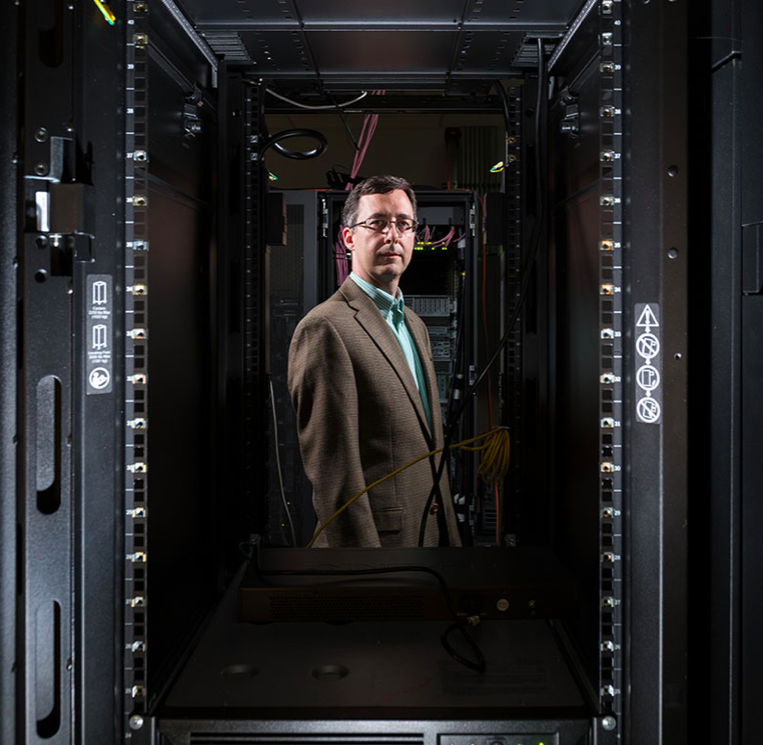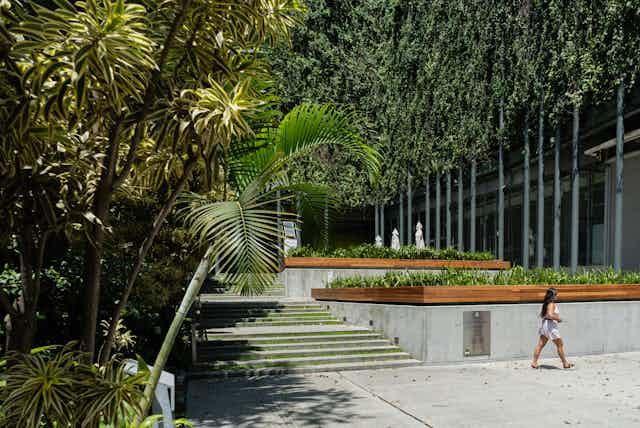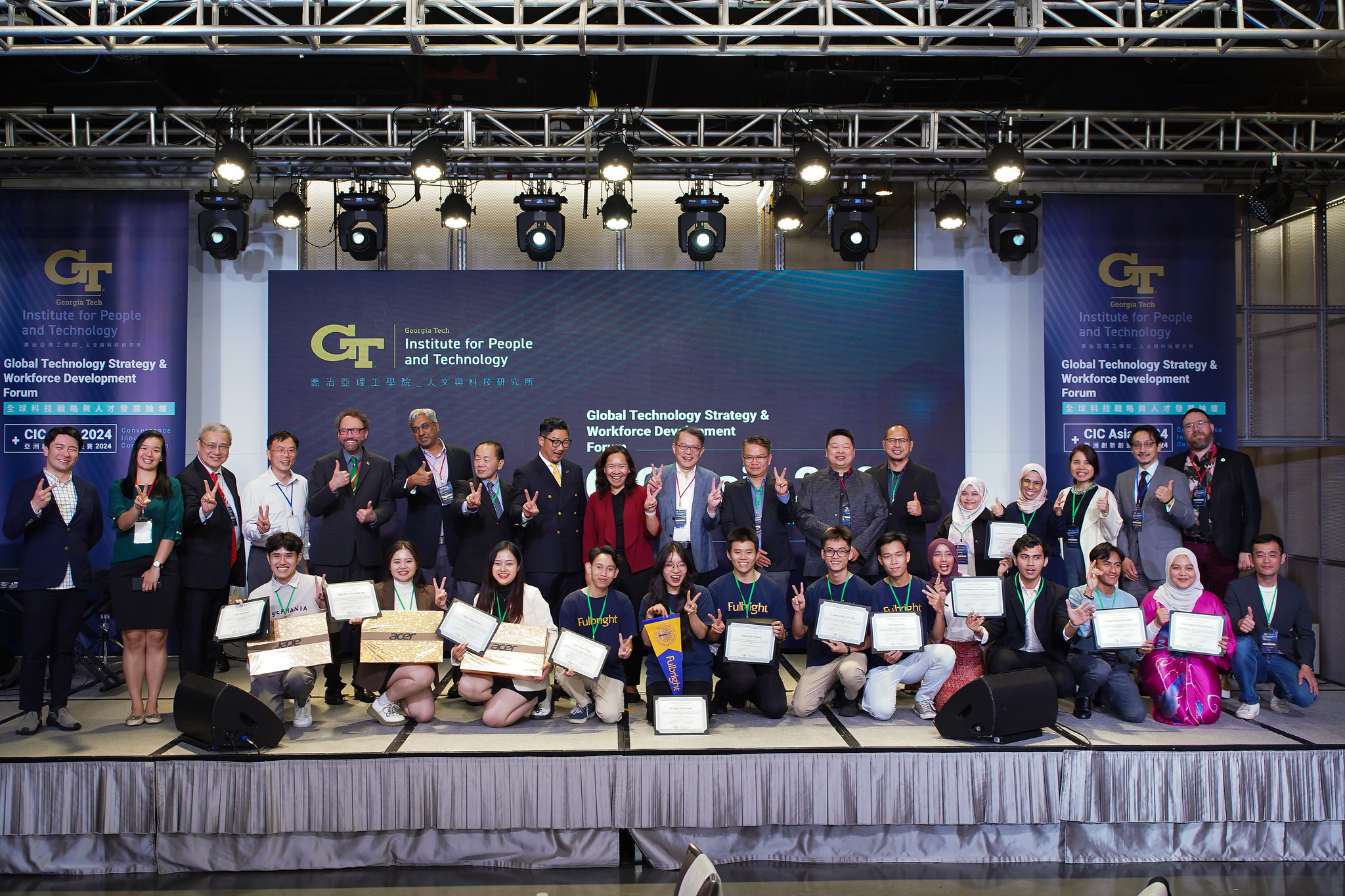Roots of Distrust: Modern Technology and the Impact of a 19th Century Voter Suppression Plan
Speaker: Richard DeMillo, Professor and Charlotte B. and Roger C. Warren Chair in Computing, School of Cybersecurity and Privacy
School of IC Reels in Best Papers, Industry Awards, and Foley Scholar Awards
Nov 25, 2024 —

The honors included best paper and impact awards from the Association of Computing Machinery’s Conference on Computer Supported Cooperative Work (CSCW). IC faculty earned industry recognition from Google and Sony, and the Institute of People and Technology (IPaT) announced its winners of the 2024 Foley Scholarships.
Walter Rich
Youth Advocacy for Resilience to Disasters: Empowering Youth to Be Advocates for Change
Speaker: Allen Hyde, Assistant Professor, School of History & Sociology in the Ivan Allen College of Liberal Arts, Georgia Tech
David Sherrill to Serve as Interim Director of the Institute for Data Engineering and Science
Jan 06, 2025 —

Effective January 1st, David Sherrill will serve as interim executive director of the Georgia Tech Institute for Data Engineering and Science (IDEaS). Sherrill is a Regents' Professor in the School of Chemistry and Biochemistry with a joint appointment in the College of Computing. Sherrill has served as associate director for IDEaS since its founding in 2016.
"David Sherrill's leadership role in IDEaS as associate director, together with his interdisciplinary background in chemistry and computer science, makes him the right person to support this transition as interim executive director," said Julia Kubanek, professor and vice president for interdisciplinary research at Georgia Tech.
Sherrill succeeds Srinivas Aluru who will be taking a new position as Senior Associate Dean in the College of Computing. Aluru, a Regents' Professor in the School of Computational Science and Engineering, co-founded IDEaS and served as its co-executive director (2016-2019) and then as executive director (2019-date), spanning eight and a half years. Under his leadership IDEaS grew to more than 200 affiliate faculty spanning all colleges, encompassing multiple state, federal, and industry funded centers. Notable among these is the South Big Data Hub, catalyzing the Southern data science community to collectively accelerate scientific discovery and innovation, spur economic development in the region, broaden participation and diversity in data science, and the CloudHub, a Microsoft funded center that provides research funding and cloud resources for innovative applications in Generative Artificial Intelligence. More recently, Aluru established the Center for Artificial Intelligence in Science and Engineering (ARTISAN), and expanded the Institute’s research staff to provide needed cyberinfrastructure, software resources, and expertise to support faculty projects with large data sets and AI-driven discovery. "I've had the pleasure of serving as Associate Director of IDEaS since it was founded by Srinivas Aluru and Dana Randall, and I'm excited to step into this interim role.” said Sherrill. “IDEaS has an important mission to serve the many faculty doing interdisciplinary research involving data science and high performance computing."
Sherrill’s research group focuses on the development of ab initio electronic structure theory and its application to problems of broad chemical interest, including the influence of non-covalent interactions in drug binding, biomolecular structure, organic crystals, and organocatalytic transition states. The group seeks to apply the most accurate quantum models possible for a given problem and specializes in generating high-quality datasets for testing new methods or machine-learning purposes.
Sherrill earned a B.S. in chemistry from MIT in 1992 and a Ph.D. in chemistry from the University of Georgia in 1996. From 1996-1999 Sherril was an NSF Postdoctoral Fellow, working under M. Head-Gordon, at the University of California, Berkeley.
Sherrill is a Fellow of the American Association for the Advancement of Science (AAAS), the American Chemical Society, and the American Physical Society, and he has been Associate Editor of the Journal of Chemical Physics since 2009. Sherrill has received a Camille and Henry Dreyfus New Faculty Award, the International Journal of Quantum Chemistry Young Investigator Award, an NSF CAREER Award, and Georgia Tech's W. Howard Ector Outstanding Teacher Award. In 2023, he received the Herty Medal from the Georgia Section of the American Chemical Society, and in 2024, he was elected to the International Academy of Quantum Molecular Science.
--Christa M. Ernst
Christa M. Ernst [christa.ernst@research.gatech.edu],
Research Communications Program Manager,
Topic Expertise: Robotics | Data Sciences| Semiconductor Design & Fab
Gregory Sawicki to Serve as Interim Director of the Institute for Robotics and Intelligent Machines
Jan 06, 2025 —

Gregory Sawicki to Serve as Interim Director of the Institute for Robotics and Intelligent Machines
Effective January 1st, Gregory Sawicki will serve as interim executive director of the Georgia Tech Institute for Robotics and Intelligent Machines (IRIM). Sawicki is a professor and the Joseph Anderer Faculty Fellow in the George W. Woodruff School of Mechanical Engineering with a joint appointment in the School of Biological Sciences.
“Professor Greg Sawicki will make a great interim executive director of IRIM. He brings experience with robotics and collaborative research to this role,” said Julia Kubanek, professor and vice president for interdisciplinary research at Georgia Tech. “He'll be a strong partner to faculty, students, and the EVPR team as we explore the future of IRIM and robotics over the next several months."
Sawicki succeeds Seth Hutchinson who will be taking a new position at Northeastern University in Boston. Hutchinson, professor and KUKA Chair for Robotics in Georgia Tech’s College of Computing, has served as executive director of IRIM for five years. During Hutchinson’s tenure as executive director, IRIM expanded its industry outreach activities, developed more consistent communications, and grew its faculty pool at Georgia Tech to include a diverse cohort from across the Colleges of Engineering and Computing and the Georgia Tech Research Institute.
"I am extremely excited to step into this leadership role for IRIM, maintain our research excellence in the foundational areas of robotics, and proactively leverage opportunities to grow across campus and beyond in novel, creative interdisciplinary directions,” said Sawicki. “This will involve new initiatives to incentivize connections with GTRI and other IRI's on campus, to build new industry partnerships, and continue to strengthen the M.S./Ph.D. program in Robotics by engaging with Schools beyond those with a traditional footprint in robotics education and research.”
Sawicki directs the Human Physiology of Wearable Robotics (PoWeR) Lab where he and his group seek to discover physiological principles underpinning locomotion performance and apply them to develop lower-limb robotic devices capable of improving both healthy and impaired human locomotion. By focusing on the human side of the human-machine interface, his team has begun to create a roadmap for the design of lower-limb robotic exoskeletons that are truly symbiotic – that is, wearable devices that work seamlessly in concert with the underlying physiological systems to facilitate the emergence of augmented human locomotion performance.
Sawicki earned a B.S. in mechanical and aerospace engineering from Cornell University in 1999, an M.S. in mechanical and aeronautical engineering from the University of California - Davis in 2001, and a Ph.D. in neuromechanics at the University of Michigan-Ann Arbor in 2007. Sawicki completed his postdoctoral studies in integrative biology at Brown University in 2009.
Sawicki has been recognized for his interdisciplinary research and teaching, recently receiving a $2.6 million Research Project Grant from the National Institutes of Health (NIH) to study optimization and artificial intelligence to personalize exoskeleton assistance for individuals with symptoms resulting from stroke. * Sawicki was also selected as a 2021 George W. Woodruff School Academic Leadership Fellow, and the 2022 College of Sciences Student Recognition of Excellence in Teaching and the 2023 American Society of Biomechanics Founders’ Award for excellence in research and mentoring. Sawicki has also been featured as an expert voice on exoskeletons and human neuromechanics in numerous print and television news releases.
--Christa M. Ernst
*Joint Award with Aaron Young, Assistant Professor in the Woodruff School of Mechanical Engineering
How cities are reinventing the public-private partnership − Four lessons from around the globe
Dec 17, 2024 — Atlanta

The Ruta N partnership in Medellín, Colombia, generated thousands of jobs. Jorge Calle/Anadolu Agency via Getty Images
Cities tackle a vast array of responsibilities – from building transit networks to running schools – and sometimes they can use a little help. That’s why local governments have long teamed up with businesses in so-called public-private partnerships. Historically, these arrangements have helped cities fund big infrastructure projects such as bridges and hospitals.
However, our analysis and research show an emerging trend with local governments engaged in private-sector collaborations – what we have come to describe as “community-centered, public-private partnerships,” or CP3s. Unlike traditional public-private partnerships, CP3s aren’t just about financial investments; they leverage relationships and trust. And they’re about more than just building infrastructure; they’re about building resilient and inclusive communities.
As the founding executive director of the Partnership for Inclusive Innovation, based out of the Georgia Institute of Technology, I’m fascinated with CP3s. And while not all CP3s are successful, when done right they offer local governments a powerful tool to navigate the complexities of modern urban life.
Together with international climate finance expert Andrea Fernández of the urban climate leadership group C40, we analyzed community-centered, public-private partnerships across the world and put together eight case studies. Together, they offer valuable insights into how cities can harness the power of CP3s.
READ THE FULL ARTICLE >>
(The Conversation, Dec 16, 2024)
Walter Rich
POSTPONED! Atlanta Veterans Affairs Medical Center Info Session
POSTPONED - Due to expected severe winter weather, the January 21 event will be rescheduled. Stay tuned for the new date!
The Atlanta Veterans Affairs Medical Center (VAMC) Research office will hold an in-person info session for Georgia Tech faculty, research scientists, and postdocs to learn about grant and collaboration opportunities.
Speakers/Panelists
Membrane Biosensor Wins Convergence Innovation Competition in Asia
Dec 11, 2024 — Taipei, Taiwan

Winning check presented to Team Membrane Biosensor. Pictured left-to-right: Michael Best, Three Students from Team Membrane Sensor, and Shelton Chan.
Team Membrane Biosensor from Yuan Ze University, Taiwan won the Georgia Tech Institute for People and Technology’s (IPaT) annual Convergence Innovation Competition (CIC) held for the first time in Taipei, Taiwan, December 7, 2024.
The winning team members were Jia-Wei Chen, Hsu-Hung Kuo, Ngoc-Ngan Dao, and Ngo-My-Uyen Nguyen. The winning team won $2,000 dollars plus each team member were given ACER laptops and other prizes. The team’s faculty sponsor was Alex Wei, dean of the Industrial Academy at Yuan Ze University.
Their innovative membrane biosensor platform offered a rapid, accurate, and cost-effective solution for disease detection, revolutionizing diagnostic systems, and enabling early intervention for improved patient outcomes and control the pandemic.
CIC is a competition recognizing student innovation and entrepreneurship responding to today’s global challenges and opportunities. Founded in 2007 in Atlanta, Georgia, CIC is organized by IPaT at the Georgia Institute of Technology.
This year, the competition expanded globally to Asia to forge new partnerships and foster more collaborations with universities across the Asian continent. IPaT’s CIC Asia Faculty Fellows helped cultivate team projects and the students so they could showcase their innovative ideas in this competition.
“The CIC students, the competition finale, and the forum all far exceeded my expectations,” said IPaT executive director Michael Best. “All four of the student finalist projects represented the very best in people-centered technologies responding to global challenges.”
CIC Asia is distinct in how it brings teams from multiple countries together to interact and network. Most innovation competitions are single university or country.
The three remaining finalist teams each received $1,000 dollars in prize money. The CIC Asia finalist team projects and team members are shown below:
- BurnUp was a project from the students at Fulbright University Vietnam. Their project aimed to create a product that protects motorbikes' engines from water penetrating through the exhaust pipe during heavy rain and small floods.
Team members included: Võ Ngọc Đan Khuê, Trần Thanh Tùng, Trương Công Gia Hiếu, Phan Xuân Quang, Trần Nam Anh. The team’s faculty sponsor was Lan Phan, head of the center, Center for Entrepreneurship & Innovation at Fulbright University Vietnam.
- GLU@U is a project from a student team at Universiti Putra Malaysia. It is a smart management system for people with abnormal sugar metabolism (i.e. diabetes). It integrates three modules: smart hardware, intelligent data management analysis + decision-making system, and medical passport care management. It uses technologies such as rtCGM, AI, cloud computing, and the Internet of Things to integrate the collection and analysis of relevant user data, the hospital-side SaaS system, and the personal health management app to form a closed loop of digital health monitoring and management inside and outside the hospital. The medical care operation and service system built by GLU@U, as well as the Internet cloud computing platform support system, constitute the full-scene, multi-dimensional operation of GLU@U's "artificial intelligence + chronic disease" intelligent monitoring and digital medical and health management.
Team members included: Jiao Fenglei, Zhang Hua, Jiang Anqi. The team’s faculty sponsor was Iskandar Ishak, associate professor of Computer Science at Universiti Putra Malaysia.
- Guardian Crossing is a project from a student team at Universiti Tenaga Nasional. Guardian Crossing is a safety device that leverages deep learning to enhance indicators aimed in reducing accident risk for pedestrians with limited ability when crossing the road.
Team members included: Nur Zafirah binti Mohd Zaini, Wan Qistina binti Wan Izahan Zameree, Syabil Fikri bin Sabri,Muhammad Danial bin Noor Shamsudin. The team’s faculty sponsor was Nur Laila Ab Ghani, lecturer of infomatics at Universiti Tenaga Nasional.
Global Technology Strategy and Workforce Development Forum
The CIC event took place alongside the Global Technology Strategy and Workforce Development Forum which was also organized by IPaT. The forum featured panel discussions on innovation and entrepreneurship, talent development, artificial intelligence (AI), and sustainable business practices. Close to 200 leaders from industry, academia, civil society, and government across Asia attended the forum and witnessed the CIC students presentations and award ceremony.
Prominent figures from Taiwan’s industry, government, academia, and research sectors participating in the forum included Liu Cheng, vice president of Tunghai University; Chang Ruey-Shiong, former president of National Taipei University of Business; Cai Qiyan, CIO of Taiwan Mobile; Albert Weng, Chairman and CEO Assistant of Qisda Corporation; Nicole Chan, chairwoman of the Artificial Intelligence Foundation; and Kai Hua, Chief Technology Officer of Microsoft Taiwan.
The event was also co-hosted by the Lee Kuan Yew Technology Development Foundation, and the Southeast Asia Impact Alliance according to Shelton Chan, managing director for international development, Asia region, with the Georgia Institute of Technology.
The Forum was mainly three panels, one on AI and sustainability, one on workforce development, and one on innovation and entrepreneurship. Panelists were a diverse group of university leaders, industry leaders, policy innovators, and included Georgia Tech faculty and alumni.
“CIC Asia and the Global Technology Strategy and Workforce Development Forum event illustrate ways that IPaT continues to grow Georgia Tech’s global influence,” said Best. “The audience was made up of high-level movers and shakers in the Asian technology ecosystem and I think we really impressed them.”
Pictures of CIC Asia and the Forum can be viewed here.
###

Group picture of participating students, faculty and some attendees to CIC Asia 2024 in Taipei, Taiwan.
Walter Rich
Neuro Next Seminar
Margaret Kosal
Associate Professor
Sam Nunn School of International Affairs
Georgia Tech
To participate virtually, CLICK HERE
Speaker Bio
